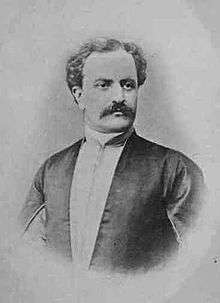Irakli Gruzinsky
Irakli Gruzinsky (Georgian: ირაკლი გრუზინსკი; Russian: Ираклий Александрович Грузинский, Irakly Aleksandrovich Gruzinsky; 18 August 1826 – 27 April 1882) was a Georgian prince belonging to the House of Bagrationi and a colonel in the Russian Imperial army. He was a grandson of Heraclius II, the penultimate king of Georgia, and the son of Prince Alexander, a staunch opponent of the Russian possession of Georgia.
| Prince Irakli Gruzinsky ირაკლი გრუზინსკი | |
|---|---|
 | |
| Born | 18 August 1826 Erivan, Persian Empire |
| Died | 27 April 1882 (aged 55) Paris, France |
| Spouse | Tamar Chavchavadze |
| Issue |
|
| Dynasty | Bagrationi dynasty |
| Father | Prince Alexander of Georgia |
| Mother | Mariam Melik-Aghamalyan |
Early life
Prince Irakli was born in Erivan, then part of the Persian Empire, in 1826. His father, Alexander, had left his homeland in 1800 and had since been trying to overthrow the Russian regime in Georgia. Irakli's mother was Mariam, daughter of Sahak Melik-Aghamalyan, the influential Armenian dignitary of Erivan. Soon after Irakli's birth, Erivan was taken by the Russian army in the course of the Russo–Persian war of 1826–1828, which occasioned Alexander's separation with his family. Mariam and Irakli lived in Erivan until 1834, when they were moved by the Russian government to St. Petersburg, where Irakli received his military training, first at the Alexandrovsky Military College and then the Page Corps.[1]
Career
Prince Irakli saw his first promotion to lieutenant in 1845 for his conduct during the expedition against the Lesgians in the Caucasus War, a year after his father died in exile in Tabriz. He was transferred to the Regiment of Mounted Grenadiers in 1852 and retired with the rank of colonel in 1855. He rejoined the Caucasian Army in 1858, but retired shortly thereafter due to failing health. He was recognized in the title of Prince (knyaz) Gruzinsky, literally, "of Georgia", in 1833 and granted the style of Serene Highness, for himself and his male-line descendants in 1865. He was an object of romantic affection of Bertha von Suttner, an Austrian novelist and the first woman to become a Nobel Peace Prize laureate, but Prince Irakli did not reciprocate.[2][3] Years later, von Suttner befriended Irakli's young wife Tamara, with whom she stayed during her visits to Tiflis and Paris.[4] Prince Irakli died in Paris aged 56 and was buried at the cathedral of Mtskheta in Georgia.[1]
Family
Prince Irakli was married to Tamara (24 January 1852 – 1933), daughter of Lieutenant-General Prince David Chavchavadze. Tamar, a lady of honour to the Empress of Russia, was a prominent socialite and philanthropist. She first became known to the larger public at the age of two when she was part of the Chavchavadze family abducted and held in captivity for ten months by Imam Shamil's men in 1854 during the Crimean War.[5]
Of the couple's four children only two daughters survived into adulthood. A son, Alexander (c. 1877–1879), and a daughter, Mariam (1876–1877), died very young. The surviving elder daughter, Elisabeth (1870–1942), was a journalist and translator from Georgian and Russian into French, also known by her penname Sazandari; she was married to Prince Mamuka Orbeliani (died 1924). The younger daughter, Ekaterina (1872–1917), was married to Prince Ivan Ratiev, known for his protection of the imperial treasure of the Winter Palace during the Bolshevik revolution in 1917.[1]
Ancestry
| Ancestors of Irakli Gruzinsky | |||||||||||||||||||||||||||||||||||||||||||||||||||||||||||||||||||||||||||||||||||||||||||||||||||||||||||||||||||||||||||||||||||||||||||||||||||||||||||||||||||||||||||||||||||||||||||||||||||||||||||||||||||||||||||||||||||||||||||||||||||||||||||||||||||||||||||||||||||||||||||||||||||||||||||||||||||||||||||||||||||||||||||||||||||||||||||||||||||||||||||||||||||||||||||||||||||||||||||||||||||||||||||||||||||||||||||||||||||||||||||||||||||||||||||||||||||
|---|---|---|---|---|---|---|---|---|---|---|---|---|---|---|---|---|---|---|---|---|---|---|---|---|---|---|---|---|---|---|---|---|---|---|---|---|---|---|---|---|---|---|---|---|---|---|---|---|---|---|---|---|---|---|---|---|---|---|---|---|---|---|---|---|---|---|---|---|---|---|---|---|---|---|---|---|---|---|---|---|---|---|---|---|---|---|---|---|---|---|---|---|---|---|---|---|---|---|---|---|---|---|---|---|---|---|---|---|---|---|---|---|---|---|---|---|---|---|---|---|---|---|---|---|---|---|---|---|---|---|---|---|---|---|---|---|---|---|---|---|---|---|---|---|---|---|---|---|---|---|---|---|---|---|---|---|---|---|---|---|---|---|---|---|---|---|---|---|---|---|---|---|---|---|---|---|---|---|---|---|---|---|---|---|---|---|---|---|---|---|---|---|---|---|---|---|---|---|---|---|---|---|---|---|---|---|---|---|---|---|---|---|---|---|---|---|---|---|---|---|---|---|---|---|---|---|---|---|---|---|---|---|---|---|---|---|---|---|---|---|---|---|---|---|---|---|---|---|---|---|---|---|---|---|---|---|---|---|---|---|---|---|---|---|---|---|---|---|---|---|---|---|---|---|---|---|---|---|---|---|---|---|---|---|---|---|---|---|---|---|---|---|---|---|---|---|---|---|---|---|---|---|---|---|---|---|---|---|---|---|---|---|---|---|---|---|---|---|---|---|---|---|---|---|---|---|---|---|---|---|---|---|---|---|---|---|---|---|---|---|---|---|---|---|---|---|---|---|---|---|---|---|---|---|---|---|---|---|---|---|---|---|---|---|---|---|---|---|---|---|---|---|---|---|---|---|---|---|---|---|---|---|---|---|---|---|---|---|---|---|---|---|---|---|---|---|---|---|---|---|---|---|---|---|---|---|---|---|---|---|---|---|---|---|---|---|---|---|---|---|---|---|---|---|---|---|---|---|---|---|---|---|---|---|---|---|---|---|---|---|---|---|---|---|---|---|---|---|---|---|---|---|---|---|---|---|---|---|---|---|---|---|---|---|---|---|---|
| |||||||||||||||||||||||||||||||||||||||||||||||||||||||||||||||||||||||||||||||||||||||||||||||||||||||||||||||||||||||||||||||||||||||||||||||||||||||||||||||||||||||||||||||||||||||||||||||||||||||||||||||||||||||||||||||||||||||||||||||||||||||||||||||||||||||||||||||||||||||||||||||||||||||||||||||||||||||||||||||||||||||||||||||||||||||||||||||||||||||||||||||||||||||||||||||||||||||||||||||||||||||||||||||||||||||||||||||||||||||||||||||||||||||||||||||||||
Notes
- Montgomery 1980, p. 66.
- Evlanoff 1943, p. 52.
- von Suttner 1910, pp. 111–118.
- von Suttner 1910, pp. 171, 314.
- Verderevsky 1857, p. 7.
References
- Evlanoff, Michael (1943). Nobel-prize donor: inventor of dynamite, advocate of peace. Philadelphia: The Blakiston Company.
- Montgomery, Hugh, ed. (1980). Burke's Royal Families of the World, Volume 2. London: Burke's Peerage. ISBN 0850110297.
- von Suttner, Bertha (1910). Memoirs of Bertha von Suttner. The records of an eventful life. Volume I. Boston and London: Published for the International School of Peace, Ginn and Company. OL 23402273M.
- Verderevsky, Evgeny (1857). Edwards, H. Sutherland (ed.). Captivity of two Russian princesses in the Caucasus. London: Smith, Elder, and Co.
Verderevski.